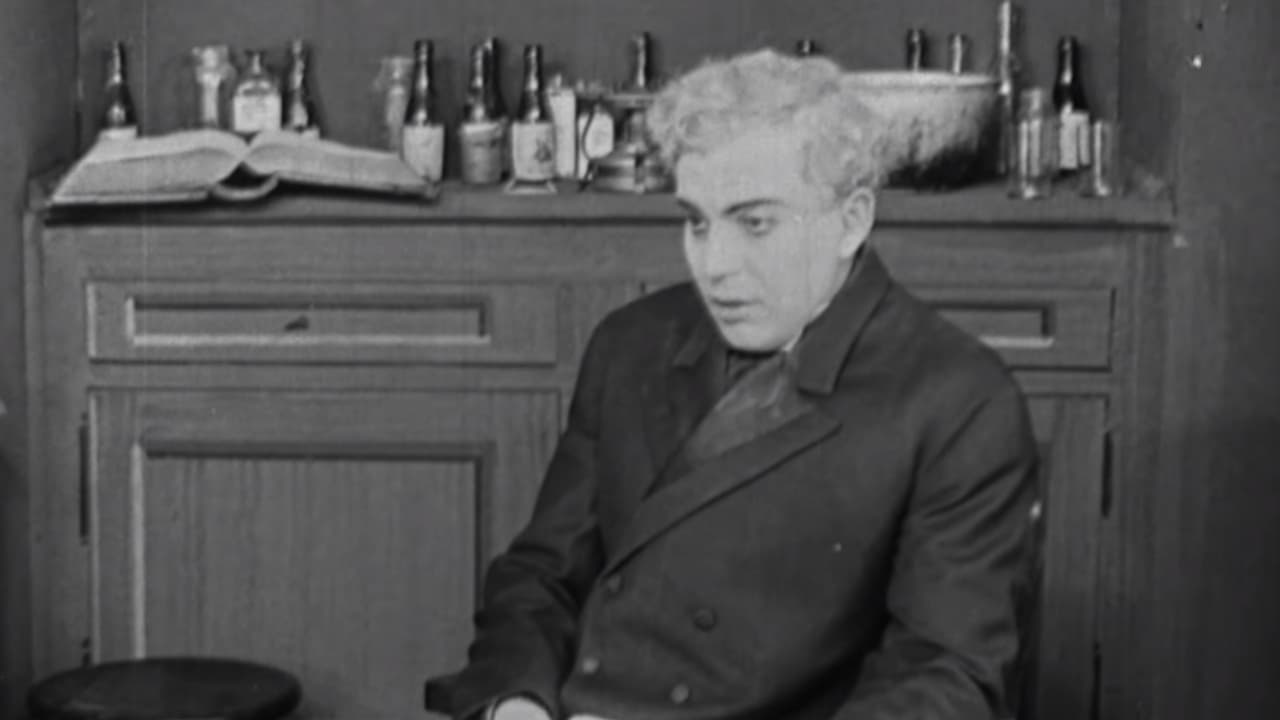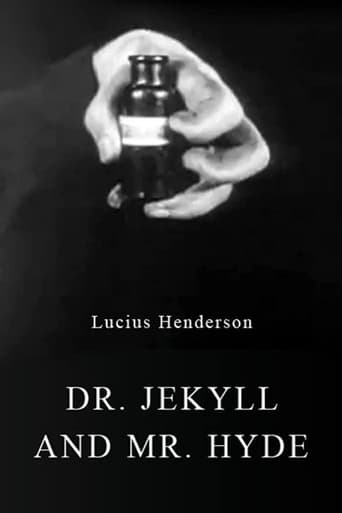

It isn't all that great, actually. Really cheesy and very predicable of how certain scenes are gonna turn play out. However, I guess that's the charm of it all, because I would consider this one of my guilty pleasures.
... View MoreI have absolutely never seen anything like this movie before. You have to see this movie.
... View MoreEasily the biggest piece of Right wing non sense propaganda I ever saw.
... View MoreA great movie, one of the best of this year. There was a bit of confusion at one point in the plot, but nothing serious.
... View MoreThe creaky classic is given an above-average treatment in this silent short. The running time clocks in at a mere 12 minutes which means that there's no time for extraneous material or slow spots, just a basic run-through of the Stevenson novella.The transformation from Jekyll into Hyde is achieved with a simple camera trick, substituting one actor for another. The story is straight-forward and comes complete with an appropriate opening (the first transformation), middle (a tragic romance) and end (a battle). The film contains a setting which was repeated for later versions. James Cruze is good as the scientist who transforms into an evil twin, coming across as a respectable gent. The actor playing Hyde goes over the top, of course, yet his portrayal works. The running time is extremely short as well, meaning that this early variation is well worth a watch.
... View MoreThe earliest Jekyll and Hyde movie known to this date stood the test of time for me by the end of the quick 10 minute film. When it comes to silent films the music chosen in the background has to be near perfect, although it sounded good at times, the music screeched too often leaving me cringe at moments. Cruze's portrayal of the doctor and the madman was fairly well done and the initial transformation scene was better than I expected. The film could have added a few more shots of written in story lines but the plot was easy to follow. This movie is the start of my deep dive in old horror classics and Dr. Jekyll and Mr. Hyde 1912 silent film was a good way to begin.
... View More"The taking of certain drugs can separate man into two beings---one representing EVIL the other GOOD" the story begins by telling us. Jekyll tests that theory on himself one night by downing an elixir, which instantly turns him into a clawed, slobbering ogre. A different elixir returns him to his normal state. More studies are needed.He later marries. His repeated use of the elixir causes uncontrollable changes in him, back into the clawed, slobbering ogre, who ransacks his own house and then takes to the streets to assault people, and ultimately kill a man.Followed by police, Hyde retreats to his home, for another dose of elixir. But when it is gone, he realizes he is now stuck as Hyde. Police chop down the door to Jekyll's study with an ax, only to find Hyde, and Jekyll, dead. Or, incredibly sleepy.Industrial look throughout helps give it a more gritty feel, but compressing the story down to a handful of minutes makes it seem like they only adapted a couple of paragraphs of the story. This is the earliest existing film version of this tale, as a 1908 version appears to be lost.
... View MoreWithout a doubt, Robert Louis Stevenson's celebrated classic, "The Strange Case of Dr Jekyll and Mr Hyde", is one of the most famous and influential novels of Gothic horror ever written, as its main theme, the inner conflict between a man's good and evil natures, has inspired countless works and several adaptations to film and stage. Thomas Russell Sullivan's 1887 stage play, "Dr. Jekyll and Mr. Hyde" was one of the most successful of its time, and soon found itself as the source for film adaptations thanks in part to the touch of romance that Sullivan added to Stevenson's tale. While the most famous adaptation of this play is without a doubt the 1920's version (starring John Barrymore), that was actually the third time the stage play was adapted to film, with the first version produced in 1908 and the second being this film, made in 1912 by the Thanhouser Company.In this version, James Cruze plays Dr. Jekyll, a respectable scientist who has dedicated his studies to the creation of a formula to separate humanity's two natures. To test the formula for a last time, Jekyll locks himself in his laboratory and drinks the potion, waiting for the effects to take place. Suddenly, he transforms into his evil alter ego, which takes the name of Mr. Hyde and begins to wreak havoc in town. Hyde takes the antidote to become Jekyll again and cover his crimes, but Jekyll's repeated use of his Hyde's persona begins to take its toll on him, making the transformation to occur without the need of the potion, almost at will. In one of these uncontrolled changes, Hyde murders the town's preacher, who is the father of Jekyll's sweetheart (Florence La Badie). This event makes Jekyll to realize how dangerous Hyde really is, but unfortunately, he no longer has the antidote.As written above, the basis for this movie is definitely the play written by Thomas Russell Sullivan, as the film moves away from the mystery of the novel and takes a more direct approach to the theme of split personalities. The movie touches an interesting theme in the idea of Jekyll becoming "addicted" to being Hyde, only to discover that his constant use of the Hyde persona has made it take over his original personality, almost like a metaphor to drug use. In those years screenplays were rarely used, but it's highly probable that director Lucius Henderson wrote one for the film, as the plot is very well developed considering the short runtime of 12 minutes (just one reel). While the style Henderson uses in the movie is pretty straightforward and a bit stagy, it's not really a bad movie and some scenes (specially the melodramatic ones) are still very effective.James Cruze, who during the 20s would become a respected director, delivers an effective performance as both Dr. Jekyll and Mr. Hyde. His Jekyll is particularly effective, as unlike most versions where the character is the epitome of goodness, Cruze makes him a flawed human in a very convincing way. His Hyde is less convincing, although that's probably because actor Harry Benham also played the character in several scenes Still, to Benham's (and Henderson's) credit, the change between actors is practically impossible to distinguish. Thanhouser regular Florence La Badie appears as Jekyll's sweetheart and she is quite good as the character, although her role in the film is considerable smaller than in the play, as the movie focuses completely on Jekyll's conflict. Interestingly, Thanhouser's child prodigy Marie Eline appears in a brief role as the kid who gets knocked down by Hyde in that classic scene.While the acting is of excellent quality (as usual with Thanhouser films), the style of the film may come off as too stagy to modern viewers and sadly, the budget limitations do show off in more than one occasion. Still, Henderson makes his movie an entertaining and to an extent, faithful adaptation of Stevenson's novel that will certainly appeal to fans of the classic tale. Lucius Henderson's version of "Dr. Jekyll and Mr. Hyde" may not be a mind blowing experience today, and even when compared to other movies of its period (the German film "Der Student Von Prag" comes to mind) it comes off as simply better than average, however, it's by no means a bad movie and I'd even say that it's required viewing for anyone interested in the early years of American horror cinema. 7/10
... View More